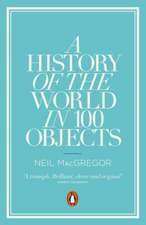Fat: Culture and Materiality
Editat de Dr Christopher E. Forth, Dr Alison Leitchen Limba Engleză Hardback – 9 apr 2014
Preț: 890.28 lei
Preț vechi: 1140.95 lei
-22% Nou
Puncte Express: 1335
Preț estimativ în valută:
170.37€ • 185.00$ • 143.12£
170.37€ • 185.00$ • 143.12£
Carte tipărită la comandă
Livrare economică 22 aprilie-06 mai
Preluare comenzi: 021 569.72.76
Specificații
ISBN-13: 9780857856166
ISBN-10: 0857856162
Pagini: 208
Dimensiuni: 156 x 234 x 18 mm
Greutate: 0.5 kg
Ediția:New.
Editura: Bloomsbury Publishing
Colecția Bloomsbury Academic
Locul publicării:London, United Kingdom
ISBN-10: 0857856162
Pagini: 208
Dimensiuni: 156 x 234 x 18 mm
Greutate: 0.5 kg
Ediția:New.
Editura: Bloomsbury Publishing
Colecția Bloomsbury Academic
Locul publicării:London, United Kingdom
Caracteristici
This unique volume is the first book to consider fat as a material substance with properties entangled with culture
Notă biografică
Christopher E. Forth is the Howard Professor of Humanities & Western Civilization and Professor of History at the University of Kansas, USA.Alison Leitch is a social anthropologist who teaches in the cultural sociology program at Macquarie University in Sydney, Australia.
Cuprins
Introduction: Materializing FatChristopher E. Forth, University of Kansas, USA and Alison Leitch, Macquarie University, AustraliaThe Qualities of Palestinian Olive Oil Anne Meneley, Trent University, CanadaIn Tastes, Lost and Found: Remembering the Real Flavor of Fat PorkBrad Weiss, College of William & Mary, USAThinking through Fat: The Materiality of Ancient and Modern StereotypesChristopher E. Forth, University of Kansas, USA Joseph Beuys: Shaman of FatAlison Leitch, Macquarie University, AustraliaEngrossing Encounters: Materialities and Metaphors of Fat in the Lived Experiences of Individuals with AnorexiaAnna Lavis, Goldsmiths College, University of London, UKFat is the Future: Bioprospecting, Fat Stem Cells, and Emergent Breasted MaterialitiesNadine Ehlers, University of Wollongong, AustraliaBound Bodies: Navigating the Margins of Fat Bodies and ClothesTrudie Cain, Kerry Chamberlain and Ann Dupuis, both Massey University, New ZealandFatsploitation: Disgust and the Performance of Weight-lossJennifer-Scott Mobley, Marymount Manhattan College, USANotesReferencesIndex
Recenzii
A welcome addition to fat appreciation, the contributions in this book highlight fat as a substance that slides, sizzles, glistens, oozes, lubricates, stains, melts, coats, congeals, and splats. The examples are compelling, the analysis is rich and the writing is entertaining. Upon reading this book, I had an insatiable urge to sip some cleansing olive oil tea and eat a barbequed pork chop.
FAT: Culture and Materiality offers a compelling and insightful interdisciplinary exploration of the complexities, properties and potentialities of fat as a substance located both within and outside of bodies. The authors traverse a fascinating range of themes and, deftly reveal how the materiality of fat and oils interconnects with some of the most pressing issues of our time, from eating disorders, semiotic and religious qualities of oil, to the idea that fat can be productive and has 'biovalue'. It is a timely and unique contribution to related fields such as body studies, fat studies and critical weight studies.
In examining the context of fat in culture, contributing authors present a multitude of fat concepts based on lived experiences; historical underpinnings; sociocultural significance; religious, biblical, and spiritual connections; political implications; societal standards; and health consequences. They explore the role of fat through a global and cultural lens, providing unique and fascinating dimensions that continue to influence human relationships with this shape-shifting substance through language, perceptions, and behavior. Editors Forth and Leitch have successfully brought together a variety of perspectives on how ideas of "fat" as a construct, lived experience, stigmatized identity, and health factor have influenced and continue to shape the manner in which people relate to each other and their environments. This innovative compilation of fat history, attitudes, and narratives will provide an excellent adjunct to upper-level disciplines with sociological, psychological, health science, gender, and cultural foci. Summing Up: Recommended. Upper-division undergraduates and above.
Fat: Culture and Materiality is a valuable volume for portraying a new way to think about a subject that, for most Americans, is only about 'obesity.' In keeping with the current state of the social sciences, it illustrates that we cannot think of fat-or any other substance or object-merely as an idea or symbol (to extend Beuys's point, substances and objects are not purely retinal or mental) but must attend to their felt (including tasted) qualities. To paraphrase (or overturn) Levi-Strauss, fat is not just good to think with but is also good or bad to experience-to have on and under your skin or on your tongue.
FAT: Culture and Materiality offers a compelling and insightful interdisciplinary exploration of the complexities, properties and potentialities of fat as a substance located both within and outside of bodies. The authors traverse a fascinating range of themes and, deftly reveal how the materiality of fat and oils interconnects with some of the most pressing issues of our time, from eating disorders, semiotic and religious qualities of oil, to the idea that fat can be productive and has 'biovalue'. It is a timely and unique contribution to related fields such as body studies, fat studies and critical weight studies.
In examining the context of fat in culture, contributing authors present a multitude of fat concepts based on lived experiences; historical underpinnings; sociocultural significance; religious, biblical, and spiritual connections; political implications; societal standards; and health consequences. They explore the role of fat through a global and cultural lens, providing unique and fascinating dimensions that continue to influence human relationships with this shape-shifting substance through language, perceptions, and behavior. Editors Forth and Leitch have successfully brought together a variety of perspectives on how ideas of "fat" as a construct, lived experience, stigmatized identity, and health factor have influenced and continue to shape the manner in which people relate to each other and their environments. This innovative compilation of fat history, attitudes, and narratives will provide an excellent adjunct to upper-level disciplines with sociological, psychological, health science, gender, and cultural foci. Summing Up: Recommended. Upper-division undergraduates and above.
Fat: Culture and Materiality is a valuable volume for portraying a new way to think about a subject that, for most Americans, is only about 'obesity.' In keeping with the current state of the social sciences, it illustrates that we cannot think of fat-or any other substance or object-merely as an idea or symbol (to extend Beuys's point, substances and objects are not purely retinal or mental) but must attend to their felt (including tasted) qualities. To paraphrase (or overturn) Levi-Strauss, fat is not just good to think with but is also good or bad to experience-to have on and under your skin or on your tongue.













